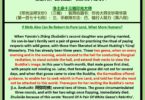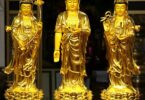◎宋黄生:
Sòng [Dynasty’s] Huáng Shēng:
黄生,潭州人,以锻铁为生。
Huáng Shēng, Tánzhōu person, [was] with [making of] wrought iron as livelihood.
[Note 1: Due to his surname and occupation, he is also known as ‘Huáng Who Forges Ironware’ (黄打铁).]
每打铁时,口称阿弥陀佛不绝。
Every [time], when [he] struck metal, [his] mouth [would] recite ‘Āmítuófó’ uninterruptedly.
[Note 2: An extended version of this case states that as he had to work busily every day, he found his life to be with much toil and suffering. One day, a monastic passed by his place, whom he invited for tea (without food as he was poor). He asked the master if there is a way to depart from his life with so much suffering that does not interrupt with his work, which took much of his time.
In reply, the master recommended him to recite Āmítuófó’s name every time he struck metal, which he was agreeable to. When his wife asked him why he practised this since his work was already so tiring, he replied that not only did he find it not so, he became more relaxed than before, instead of fretting about his suffering. With increase in peace of mind and blessings of the Buddha, even the furnace seemed less hot, and the hammer less heavy.]
一日,口占一颂,令邻人书之。曰,
One day, [he] recited a verse, [and] led [a] neighbour [to] write it. [It] said,
「
玎玎珰珰,
久炼成钢。
太平将近,
我往西方。」
‘Dīng dīng dāng dāng [i.e. the sound of metal hit],
[with] long tempering accomplishes hard steel.
Great peace [is] near,
[as] I [am going to be] reborn [in the] West[ern Pure Land].’
[Note 3: ‘Long tempering accomplishes hard steel’ is also an analogy for how his skill of mindfulness of Buddha was forged through much everyday life practice to become strong and steady, even in the midst of hard mundane work. ‘Great peace’ refers to that to be experienced when the Pure Land Of Peace And Bliss (安乐国) is reached. Saying it ‘[is] near’ was declaration of his ‘knowing in advance, of when (he will) reach’ (预知时至) Pure Land. The more regular practice there is, even if scatter-minded, the ‘nearer’ Pure Land is eventually.
The verse expressed his great confidence, and the complete presence of the Three Provisions of Faith (in Pure Land), Aspiration (to reach Pure Land) and (adequate) Practice (to do so).]
且云,「我去后,可将此颂流布,广劝人念佛也 」 ,即化去。(佛祖统纪)
[He] also said, ‘After I [am] gone, [you] can use this verse [to] spread [it, to] widely encourage people [to be] mindful [of] Buddha [diligently’, as he] immediately departed [to reach] Pure Land. (Chronicles [Of] Buddhas [And] Patriarchs)
[Note 4: An extended version of this case states that this occurred after three years of practice, when he suddenly told his wife, (despite already being at his worldly home), to prepare a clean set of clothes for him, as he will be going (to his spiritual) ‘home’ (i.e. where he really belongs and should go – Pure Land) tomorrow. However, she did not understand, as he was already at home.
The next day, demonstrating great ease, he got clean clothes by himself, struck metal again for the last time, while reciting his verse, before departing while standing. As his rebirth was immediate, it can be said to had occurred within a single thought of mindfulness of Buddha in his mind, right after he finished hammering, as he was that proficient in practice. With much practice with many recitations, he became able to quickly depart with just a few. With much practice comes much ease of departure naturally.
It should not mistaken that reciting of the verse (which was shared out of compassion to promote mindfulness of Buddha) was the practice that led to Pure Land. Chronologically, the requesting of his neighbour to propagate the verse could be done just before he departed, on the day after informing his wife.]
[Note 5: Huáng Shēng’s practice is a classic case of not so much ‘multi-tasking’, but ‘dual-tasking’ at first. It reminds us that even in the midst of mundane but well-honed mechanical work, that might not require much complex thinking, we can also have spiritual practice with scatter-minded mindfulness (散心念), that can gradually develop to become focus-minded mindfulness (专心念), just as the ‘dual-tasking’ eventually becomes wholehearted ‘single-tasking’. (Scientists have shown that overall efficiency when multi-tasking for tasks undertaken is much less than when single-tasking for each task one by one.)
Huáng Shēng gives us no excuse to not practise. Even if our work is too complex to allow dual-tasking, there are other simpler aspects of everyday life like walking, waiting, eating, drinking, bathing… when we can practise. This is how we can spiritualise even ‘inescapable’ mundane routines and responsibilities, instead of continually fretting about them. Of course, to progress swifter, we should ideally reserve time for solely practice with focused mindfulness too.]
《净土圣贤录》:
Record [Of] Pure Land’s Noble Sages:
卷九 • 往生杂流第八
Scroll Nine: Eighth Section [On] Rebirths [Of Those With] Mixed Occupations
彭希涑撰 (zhuàn)
Compiled [by] Péng Xīsù
Namo Amituofo : Translation and notes by Shen Shi’an
Related Articles:
From Half-hearted Multi-tasking To Wholehearted Single-tasking
https://purelanders.com/2019/11/20/from-half-hearted-multi-tasking-to-wholehearted-single-tasking
宋潭州黄打铁
[26] [17] Sòng Dynasty’s Tánzhōu’s Huáng Who Forges Ironware
https://purelanders.com/2022/01/26-song-dynastys-tanzhous-huang-who-forges-ironware





